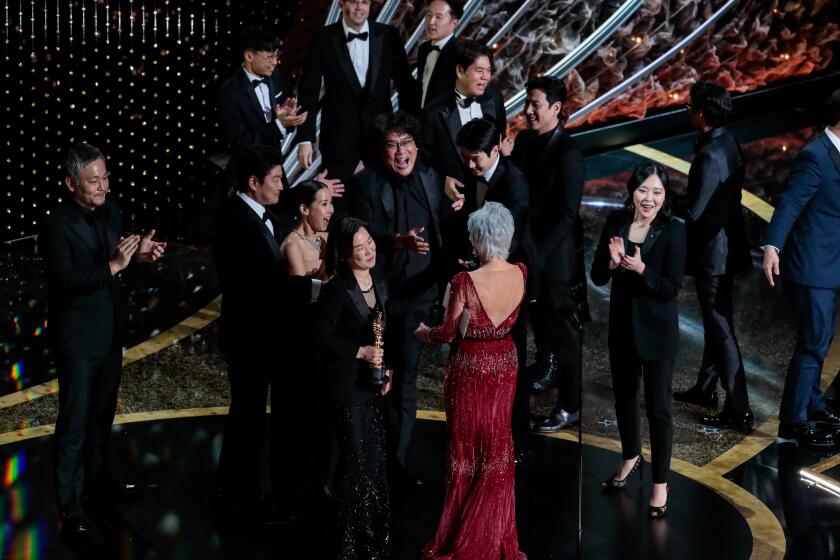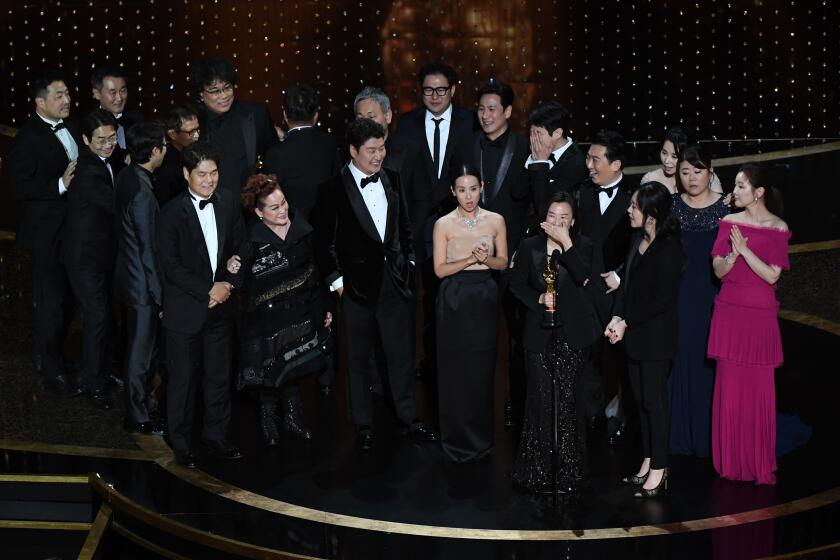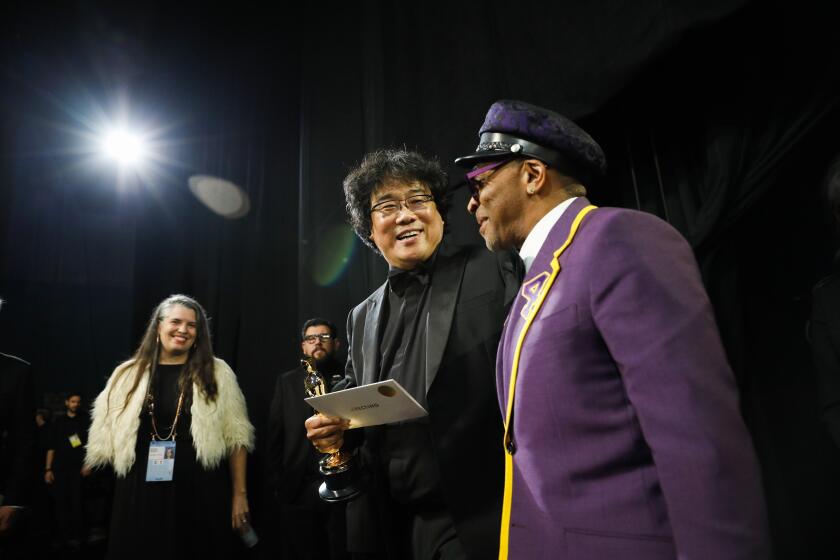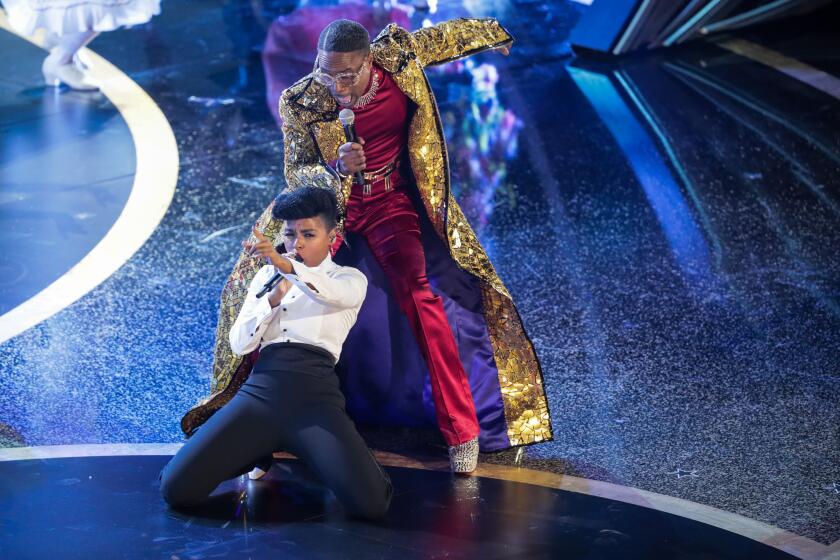‘Parasite’ pulls off Oscar upset, winning four Academy Awards

A historic best director Oscar goes to ‘Parasite’ filmmaker Bong Joon Ho, the first Korean winner and only the second director to win the prize for a film not in English.
In an upset victory and a historic milestone, director Bong Joon Ho’s “Parasite” — a darkly comic class satire about two families, one rich and one poor, whose lives become entangled — won best picture Sunday night at the 92nd Academy Awards, becoming the first foreign-language movie to win the film academy’s top prize.
Throughout awards season, “Parasite” was seen by many as the underdog in a field that included Martin Scorsese’s gangster drama “The Irishman,” Quentin Tarantino’s 1960s fantasia “Once Upon a Time … in Hollywood” and Sam Mendes’ World War I movie “1917.” But over time, the South Korean film worked its way into the hearts of Oscar voters, whose ranks have grown increasingly international and diverse in recent years.
The cast of “Parasite” at the 92nd Academy Awards
The road to the Oscar for “Parasite” kicked off in May when the film claimed the Palme d’Or at the Cannes Film Festival. Despite Bong’s idiosyncratic, genre-scrambling vision — or perhaps because of it — “Parasite” went on to become a mainstream box-office success like few foreign-language films in memory, earning the Screen Actors Guild’s ensemble award along with a slew of critics group prizes.
“Parasite” claimed four Oscars in total, with Bong earning the directing prize along with best international feature film and original screenplay, the first time a Korean filmmaker had won those prizes. The film itself was the first nominee from South Korea in all four categories it won and the first screenplay winner from Asia.
Bong himself seemed surprised to have won the directing prize over a field that included Mendes, Scorsese and Tarantino. “After winning best international feature, I thought I was done for the day and was ready to relax,” he said. “When I was young and studying cinema, there was a saying that I carved deep in my heart, which is that the most personal is the most creative. That quote is from our great Martin Scorsese.”
Heading into the night, “1917” was widely considered the film to beat, having swept the director and drama honors at the Golden Globes as well as the top prizes from the producers and directors guilds. In contrast to the boundary-pushing “Parasite,” Mendes’ war epic is in many ways a more old-fashioned Oscar film, boasting the sort of grand sweep, period setting and rousing themes of bravery and sacrifice that have often been hallmarks of best picture winners dating all the way to the very first, 1927’s silent World War I movie “Wings.” In the end, “1917” earned three awards, for cinematography, sound mixing and visual effects.
In recent years, the Academy of Motion Picture Arts and Sciences has brought in hundreds of new members from overseas as part of its ongoing effort to diversify its historically white-male-dominated membership. In naming “Parasite” both best picture and best international feature, the organization seemed to be embracing the chance to show that it has become less parochial and more open-minded than it may have been in decades past.
With “Parasite,” the academy gave best picture to the actual best picture. It also made history.
The acting prizes were largely foregone conclusions, with each of the four winners having opened up insurmountable leads over their competition by sweeping all the major precursor prizes in the awards horse race.
Joaquin Phoenix won the lead actor award for his physically transformative turn as a troubled would-be comedian-turned-supervillain in the dark comic-book blockbuster “Joker.”
In the run-up to the Oscars, Phoenix’s acceptance speeches at the Golden Globes, SAG Awards and BAFTAs had been every bit as unpredictable and mesmerizing, in their own way, as his performance in “Joker” — and on that score, his Oscar acceptance speech didn’t disappoint, with the actor touching on themes of inclusion, environmentalism and personal redemption, and choking up as he invoked his late brother, River.
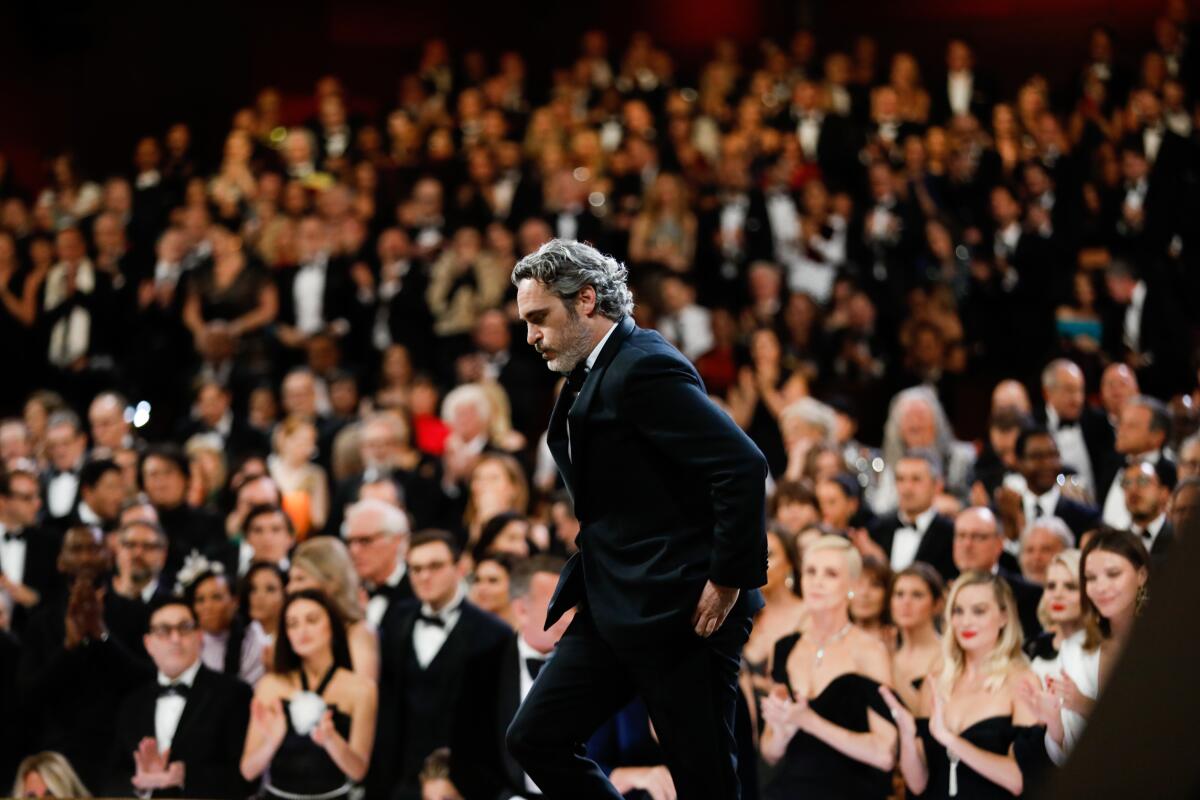
“I’ve been a scoundrel in my life. I’ve been selfish, I’ve been cruel at times, hard to work with, and I’m grateful that so many in this room have given me a second chance,” said Phoenix, who had never previously won an Oscar. “I think that’s when we’re at our best, when we support each other.”
As expected, Renée Zellweger won the lead actress award for her turn in “Judy” as Hollywood icon Judy Garland near the end of her turbulent life, telling the starry crowd in the Dolby Theatre that when heroes like Garland are celebrated, “we’re reminded of who we are as one people, united.”
In the supporting categories, academy voters spread their love to two veterans who, despite being veritable industry royalty, had never won acting Oscars. Laura Dern won for her performance as a fierce divorce lawyer in “Marriage Story,” while Brad Pitt won for his turn as a grizzled stuntman in Tarantino’s “Once Upon a Time,” delivering one of the most charged political moments of the night in his acceptance speech.
“They told me I only have 45 seconds up here, which is 45 seconds more than the Senate gave John Bolton” at the impeachment trial, Pitt said.
Join us backstage at the Academy Awards for behind-the-scenes bits with a jubilant Bong Joon Ho, an emotional Joaquin Phoenix, Billie Eilish, Spike Lee, Maya Rudolph and others.
Heading into the evening, Netflix — propelled by best picture nominees “Marriage Story” and “The Irishman” — had outpaced all other studios and distributors with 24 nominations. The most disruptive force to hit the movie business since the advent of television, the streaming giant has leveraged its vast resources in recent years in an effort to win its first Oscar for best picture.
But in the end, in what may be a sign of lingering resistance among Oscar voters to the company’s streaming-centric business model, Netflix pulled in just 2 wins (Dern’s victory for “Marriage Story” and the documentary feature win for “American Factory”), with its biggest contender, “The Irishman,” coming up empty-handed despite 10 nominations — the only best picture nominee to be shut out in a night that saw Oscar voters spread their affection to nearly every contender.
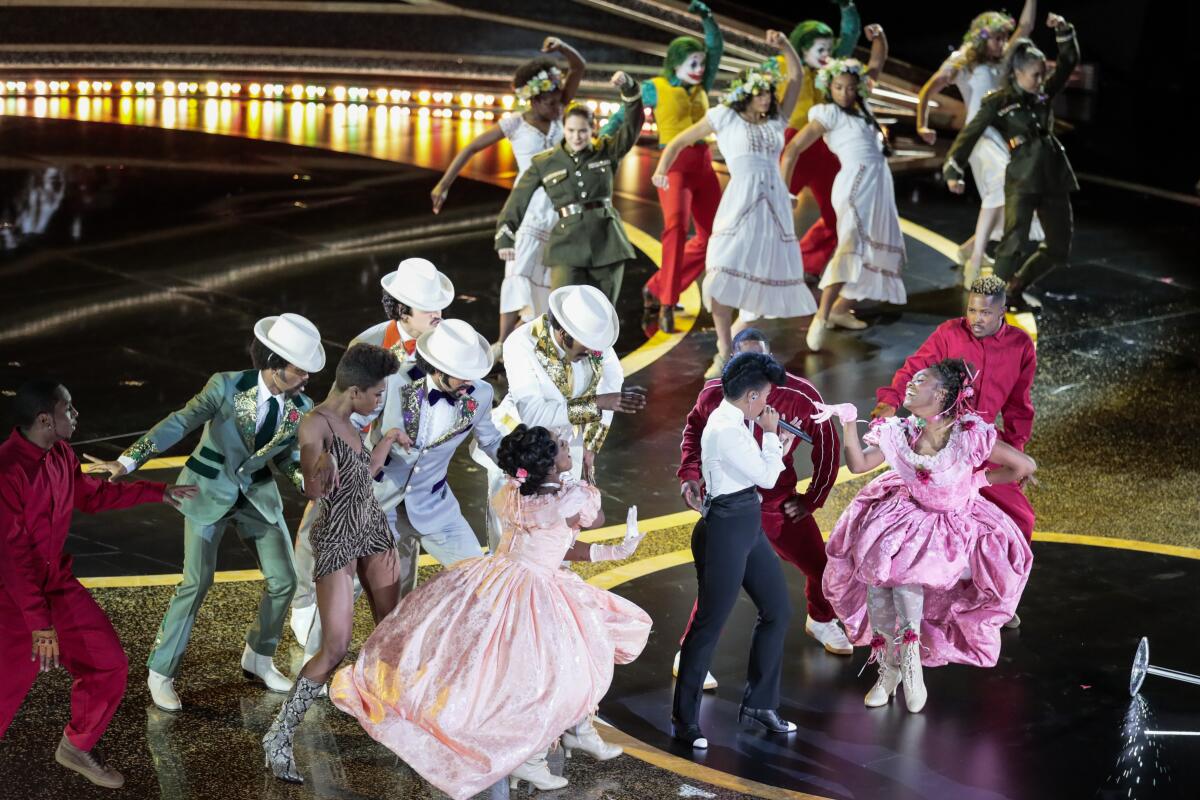
For the second year in a row, the Oscars had no formal emcee — probably a result of both of the compressed timetable for this year’s show, which fell on the earliest date in Oscars history, and the growing sense among many potential hosts that what was once considered a plum job has become a largely thankless one. (Last year’s planned host, comedian Kevin Hart, ultimately dropped out just days after being announced amid controversy over past homophobic jokes.)
Janelle Monáe kicked off the show with an energetic musical performance featuring backup dancers clad in costumes from films including “Midsommar,” “Jojo Rabbit” and “Joker,” setting an upbeat, celebratory tone for the night that stood in stark contrast with the current unsettled, politically divisive climate.
The rest of the ceremony leaned into the star power of presenters such as Kristen Wiig, Julia Louis-Dreyfus and Lin-Manuel Miranda and musical performances by Billie Eilish, who sang the Beatles’ “Yesterday” during the In Memoriam segment, and Elton John, who sang “(I’m Gonna) Love Me Again” from “Rocketman,” which won in the original song category. Most surprising (and somewhat confusing), rapper Eminem made an unannounced appearance to perform his Oscar-winning song “Lose Yourself” from the 2002 film “8 Mile.”
Taking the stage together to deliver a twist on the standard opening monologue, past Oscars emcees Steve Martin and Chris Rock acknowledged the apparent new normal of the hostless Academy Awards. “They don’t really have hosts anymore. Why is that?” Martin asked. “Twitter,” Rock answered.
The win for “Parasite” aside, one of the biggest surprises of the night had nothing to do with statuettes. Midway through the show, Tom Hanks announced that the long-awaited Academy Museum of Motion Pictures — which has been beset by cost overruns and delays — will finally open Dec. 14. “A bunch of us were over there just this morning,” Hanks joked. “I was putting up drywall. Scarlett Johansson had brought over her orbital sander. Brad Pitt was on the roof, working with his shirt off.”
From a performance by Eminem to the presenters’ funniest gags, the Oscars telecast highlighted the tension between old and new in the film academy.
In recent years, even as the academy has worked to diversify its ranks, issues of representation have loomed large over the Oscars, and this year was no exception. In the weeks leading up to the show, many criticized the organization for failing to nominate any female directors. On the red carpet, actress Natalie Portman wore a black Dior cape with the names of female directors who were left out — including Greta Gerwig (“Little Women”), Lulu Wang (“The Farewell”) and Marielle Heller (“A Beautiful Day in the Neighborhood”) — etched in gold.
Meanwhile, the academy only narrowly avoided a reprise of the #OscarsSoWhite controversy that has dogged it in recent years, with just one person of color, “Harriet” star Cynthia Erivo, among the 20 acting nominees. “Cynthia did such a good job hiding black people in ‘Harriet’ that the academy got her to hide all the nominees,” Rock cracked early in the show.
Still, on the inclusion front, the night included a number of firsts. Along with “Parasite’s” wins, “The Peanut Butter Falcon” star Zack Gottsagen made history as the first Oscar presenter with Down syndrome.
In the adapted screenplay category, “Jojo Rabbit” writer-director Taika Waititi became the first person of Maori descent to win an Oscar, dedicating his award “to all the indigenous kids of the world who want to do art and dance, and write stories. We are the original storytellers, and we make it here as well.” (Later in the show, Waititi acknowledged that the show itself was being held on the ancestral lands of the Tongva, Tataviam and Chumash peoples.)
Accepting his prize for supporting actor, Pitt reflected on the long and winding road of his own career — and, in a broader sense, spoke to the long and winding history of the movies that the awards show celebrated.
“Once upon a time in Hollywood,” the actor said, shaking his head. “Ain’t that the truth.”
More to Read
Only good movies
Get the Indie Focus newsletter, Mark Olsen's weekly guide to the world of cinema.
You may occasionally receive promotional content from the Los Angeles Times.
